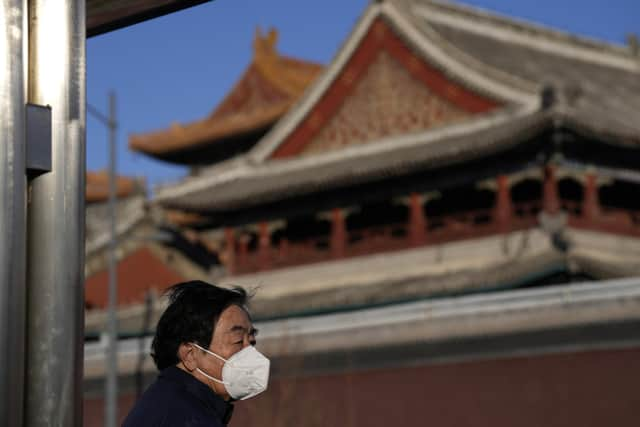China Covid rules: China ends Covid quarantine for travellers as country looks to reopen to the world
A report from People's Daily claimed China will downgrade management of Covid to Class B and cancel quarantine requirements on inbound travellers from Jan. 8, 2023, China's top health authority announced, meaning that after almost three years of closed borders, China will reopen the country to those with work and study visas, or seeking to visit family.
The move will also mean that Chinese citizens will also be able to travel overseas marking China’s move to "living with Covid" after three years of lockdowns, closed borders and mandatory quarantine for Covid cases and contacts, having adopted a zero-Covid approach which hit the economy and made citizens weary of restrictions and repeated tests.
Advertisement
Hide AdAdvertisement
Hide AdSince March 2020, anyone entering China had to undergo mandatory quarantine at a state facility - for up to three weeks at a time. That was recently reduced to five days, with anger over the zero-Covid policy resulting in rare public protests against President Xi Jinping in November.


Cases of Covid are reportedly still high in China, with the true toll - daily case counts and deaths - currently unknown because officials have stopped releasing data with reports suggesting Covid is spreading since restrictions were eased.
In a statement, the National Health Commission (NHC) renamed the Chinese term for Covid-19 from "novel coronavirus pneumonia" to "novel coronavirus infection," and manage the disease from Class A to Class B in accordance with the Law of the People's Republic of China on Prevention and Treatment of Infectious Disease.
Additionally, Covid will no longer be included in the quarantinable infectious disease management following the Frontier Health and Quarantine Law of the People's Republic of China.
The decision was made after China's Covid-19 control reached a new stage as the virulence of the virus dropped. According to the document, the country will no longer implement quarantine measures for infected individuals, and stop tracking close contacts or designating high-risk and low-risk areas. It will provide classified treatment for cases and promptly modify medical care policies.
The document further clarifies that starting from January 8, China won't conduct any quarantinable infectious disease control measures for inbound persons and imported goods. Passengers entering the country still have to take nucleic acid tests 48 hours before departure.
The country will gradually resume passenger entry and exit at sea and land ports, as well as outbound tourism in an orderly manner. Arrangements for foreigners to visit China for work, business or other purposes will be improved and the required visas will also be facilitated, the document added. It is unclear if that includes tourist visas, but officials said a pilot programme would begin for international cruise ships.
Despite the changes, China will keep track of the spread of Covid and strengthen the health monitoring of special groups such as the elderly.
Advertisement
Hide AdAdvertisement
Hide AdControls had been expected to stay in place at least through to mid-2023.
Foreign companies have welcomed China’s decision to end quarantine for travellers from abroad as an important step to reviving slumping business activity.
“It finally feels like China has turned the corner,” the chairman of the American Chamber of Commerce in China, Colm Rafferty, said in a statement.
He said ending the quarantine “clears the way for resumption of normal business travel”.
Business groups have warned that companies were shifting investment away from China because foreign executives were blocked from visiting.
The American chamber said that more than 70% of companies who responded to a poll this month expected the impact of the latest wave of outbreaks to last no more than three months, ending in early 2023.
The British Chambers of Commerce expressed hope that China would restart normal processing of business visas to allow “resumption of crucial people to people exchanges”.
It said it would “contribute to restoring optimism and reinstating China as a priority investment destination”.
Advertisement
Hide AdAdvertisement
Hide AdThe move “will potentially boost business confidence,” but companies were likely to “wait to see how the situation on the ground evolves” before making long-term decisions, the European Union Chamber of Commerce in China said in a statement.
Meanwhile, Japan announced that visitors from China would undergo virus tests starting on Friday as a “temporary emergency measure”.
Visitors who tested positive would be quarantined for one week, Prime Minister Fumio Kishida announced.
He said Japan would also reduce a planned increase in the number of flights between Japan and China “just to be safe”.
This followed India’s decision last week to begin requiring a negative virus test for travellers from China, Japan, Hong Kong, South Korea and Thailand.
India also randomly tests 2% of airline passengers arriving from abroad. Visitors who test positive or have symptoms are quarantined.
A foreign ministry spokesman defended China’s handling of the latest outbreaks.
“The Chinese government has always followed the principle of science-based and targeted measures,” Wang Wenbin said.
Advertisement
Hide AdAdvertisement
Hide AdHe called for a “science-based response and co-ordinated approach” to keep travel safe and “promote a steady and sound recovery of the world economy”.
China kept its infection rate low with a “zero Covid” strategy that aimed to stamp out virus transmission by isolating every case. This prompted complaints that controls were too extreme and counterproductive.
Starting last month, the ruling party has gradually joined the UK and US and other governments that are trying to live with the virus by treating infections instead of imposing blanket quarantines on cities or neighbourhoods.
The country's top online travel agencies reported a spike in traffic within hours of the announcement. Prior to the pandemic, the number of outbound tourists from China stood at 155 million in 2019, according to Statista. This number dropped to 20 million in 2020.